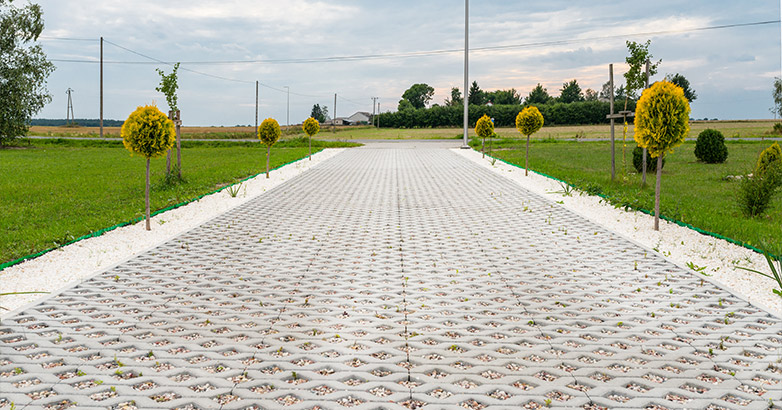Permeable Driveway – 7 Options, Benefits and Costs
A permeable driveway allows water to seep through its surface and the sub-base. The driveway can then be covered with grass or loose gravel to prevent heat from accumulating while adding aesthetic value to your landscape. It is approved globally as a tried-and-true response to stormwater management and environmental issues.
Permeable driveways are becoming popular in the United States. Up to 95% of surface rainwater can penetrate through the pavement surface thanks to permeable paving, which employs purpose-built segmental paving units and properly graded base materials. This prevents surface stormwater from collecting or flowing into drains. In comparison, other paving materials add to greenhouse gas emissions which result in climate change. Asphalt, concrete, and other paving materials might contribute to water contamination, erosion, and urban heat leading to the heat island effect. Its goal is to build a sustainable urban environment.
Choosing permeable paving (i.e., paving that enables water to flow through it instead of racing to the nearest sewer) is an environmentally responsible decision. And when you can be both environmentally conscious and save money, what’s not to like? Therefore, we created this comprehensive guide that explains all permeable driveway options, their pros and cons, and how much they cost.
What is a permeable driveway?
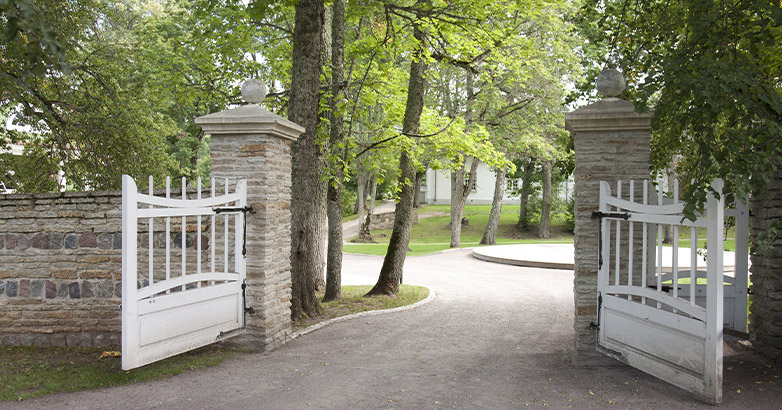
A permeable driveway paving system facilitates efficient drainage by capturing and filtering precipitation into the soil. This is achieved through the use of porous paving materials that absorb water. Some permeable pavements feature nonporous block gaps, enabling stormwater to drain through the surface. Beyond efficient drainage, these driveways offer numerous benefits, including the prevention of contaminants and chemicals, as well as protection against driveway erosion.
7 Permeable driveway options
A porous driveway is made from a variety of porous materials. They are easy to install and do not require a sub-base, usually sand or gravel. They are also easy to maintain, and they are durable. When you choose a more sustainable and protective paving material for your driveway, permeable paving has several options you can choose from. These include :
1. Pervious concrete
Pervious concrete is made from a mixture of porous materials. Permeable concrete feels and looks like concrete but is permeable to water. Also, they are made up of a mixture of stones and concrete. It is designed to channel water away from your drainage or sewage and absorb it into the ground. This sustainable urban drainage system makes living in an eco-friendly environment possible.
2. Porous asphalt pavement
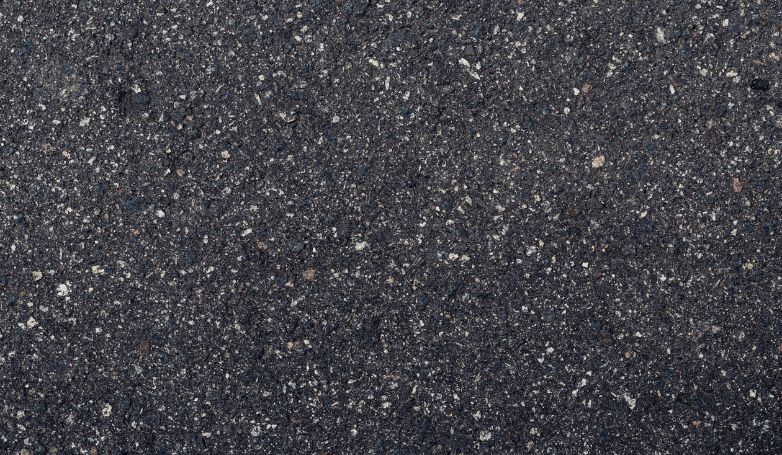
Permeable asphalt paving has small gaps between the aggregates that allow water to pass through the asphalt and drain into the stone bed. Permeable asphalt driveways contain bitumen containing tar, aggregates, and additives. This paving provides a solid surface strong enough to withstand pressure and traffic. It also offers safety measures by reducing frozen water on asphalt pavement. For local authorities and commercial entities, permeable asphalt driveways offer many economic benefits.
3. Grass permeable driveway
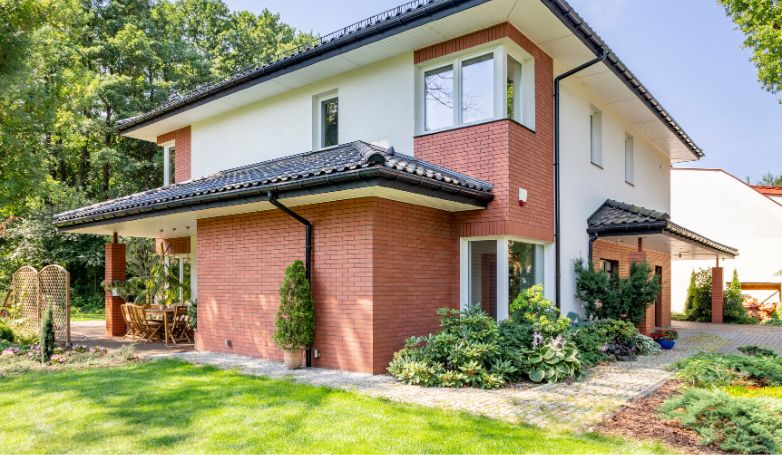
With grass pavement, you can create an eco-friendly driveway. It has a better water management system and protects your environment from floods. A grass driveway also acts as a natural filter by trapping pollutants and allowing rainwater to return to local aquifers. A grass permeable driveway looks aesthetically pleasing and possesses numerous advantages, some of which include;
- A clean driveway you can drive through or walk on without getting dirt from mud after heavy rain.
- An appealing parking space that blends in with your environment.
- A driveway with high compression strength
- Grass permeable pathways have proven to be durable, with a solid surface.
- Grass permeable driveways don’t require expensive skills to be installed. They are easy, quick, and need less labor.
If you want to create a sustainable driveway, grass pavers are the right paving material.
4. Gravel and loose stones
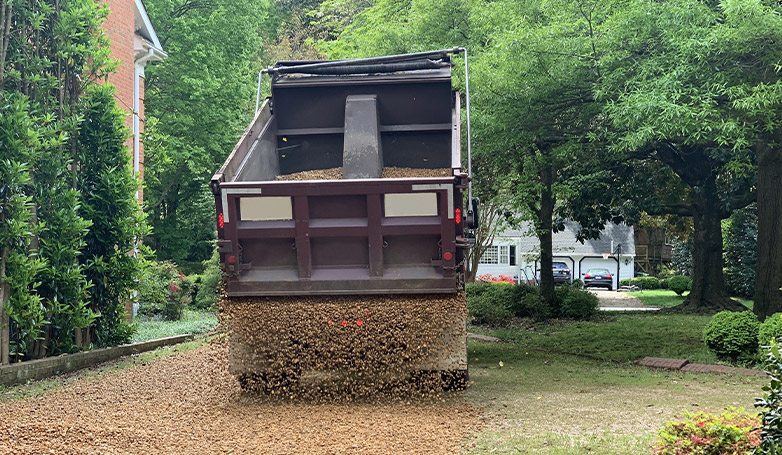
When it comes to driveway paving, we are not just after what’s appealing to the eyes. Gravel and loose stones provide a durable and affordable parking space for your vehicles. Installing gravel and loose stones is effortless, requires low maintenance, and has many styles and sizes. The natural crunching sound of gravel won’t catch you off guard when a guest drives or walks into your driveway.’s safe to say that gravel comes with a light alarm and security.
It’s common for driveways of any type to age with time; thus might include cracks and potholes. Extra gravel will save the day when this happens to your gravel and loose stone driveway. It will help if you top your gravel driveway every eighteen months to reduce the risk of driving into a pothole and destroying your engines or part of your car.
5. Permeable brick driveway
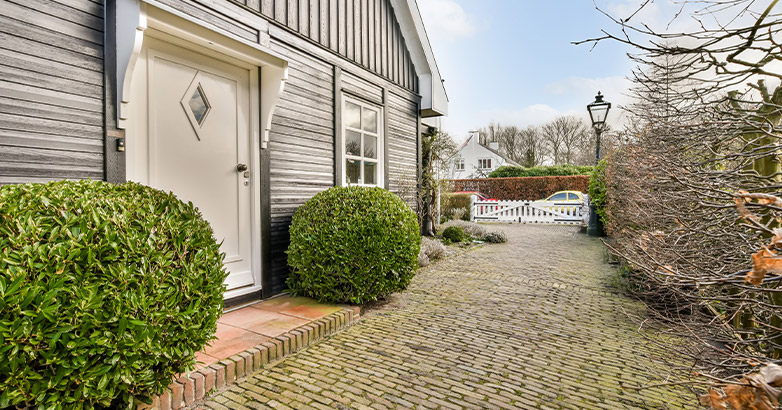
Creating a suitable parking area requires a lot of deliberation. However, porous brick has proven to be the best permeable paving material to help you create a sustainable environment during heavy rain. This driveway filters and absorbs water until it reaches the soil below it. A brick driveway can reduce the amount of flood and erosion.
Landscapers keep searching for the best way to ensure that your driveways are suitable and convenient; they also ensure that your landscape pavement is protective enough to keep you, your family, and your business safe.
6. Permeable resin driveway
A mixture of UV-stable polyurethane resin aggregates forms resin-bound or troweled paving. The porous resin filters water as it passes through the sand base, and the ground ultimately absorbs the filtered water. When used to pave driveways, this mixture forms a strong surface with no loose stones. Resin paving helps in flood prevention and provides a stunning aesthetic.
7. Plastic grids
If you are thinking about changing your driveway surface, plastic grids present the quality and stability your driveway needs. This paving material represents a sustainable urban drainage system that is rot-resistant and can support heavy traffic or vehicles. High-quality and durable recycled materials constitute plastic grids driveways, making them easy to install and environmentally friendly.
Benefits of permeable paving
Beyond its resemblance to concrete, opting for a permeable driveway offers several advantages, proving to be a cost-effective and environmentally friendly choice. Key benefits include:
They are made from 100% natural and sustainable materials
Driveways made of pervious paving, utilizing natural and sustainable materials, offer an eco-friendly solution without causing harm to the environment or the community.
Materials used for paving include natural aggregate, recycled glass or marble, and plant-derived resins. Opting for pervious paving in your driveway actively contributes to fostering a healthier atmosphere, aligning with environmentally conscious practices.
They prevent floods and act as natural filters
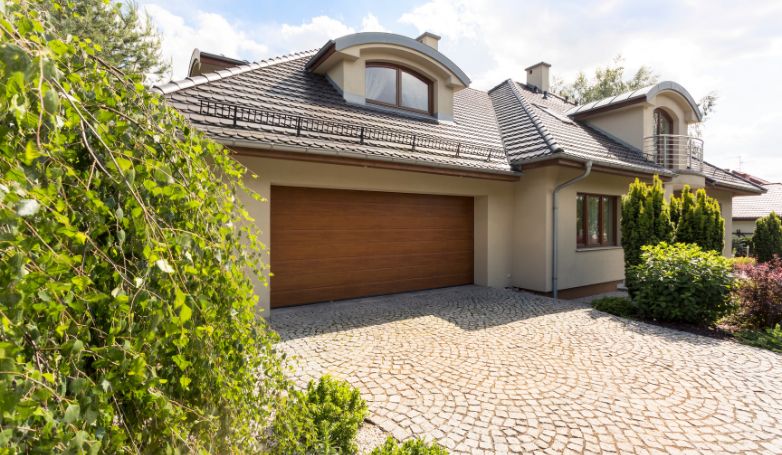
Pervious paving serves as a natural filter, effectively removing dirt and pollutants while providing your driveway with access to air and moisture. The inherent water-absorbing properties of natural paving materials contribute to a decreased volume of water directed towards drainage systems, effectively minimizing driveway puddles and preventing potential floods.
Low-maintenance
Permeable paving will always stand out cause they require less maintenance to survive. As long as you keep up with the basics, you won’t have to worry about replacing or repairing your driveways anytime soon.
They effectively reduce water puddles
Pervious paving prevents standing water. When you drive in, you won’t have to deal with the frustration of clearing any puddles. Pervious paving drains water without damaging your driveway. Also, permeable concrete paving gets rid of black ice worries during winter. Because it absorbs water, permeable driveways release less heat at night and less heat during the day.
Permeable driveway ideas
When it comes to choosing a driveway sealer, the market offers various options tailored to different needs. Here are the best driveway sealers categorized by their base materials, providing you with insights into their specific benefits.
Turf block pavers
Turf block pavers are a type of permeable paving system designed to allow grass or other vegetation to grow within the paver openings. These interlocking blocks feature open spaces that can be filled with soil and planted with grass, providing a green and eco-friendly alternative to traditional pavement. Turf block pavers are commonly used in driveways, parking lots, and pedestrian pathways to reduce stormwater runoff, promote groundwater recharge, and enhance the aesthetic appeal of outdoor spaces. The permeable nature of these pavers also helps mitigate the heat island effect in urban areas by allowing water to infiltrate rather than reflecting heat like traditional pavement surfaces.
Grass pavers
Grass pavers, similar to turf block pavers, are a type of paving system that incorporates open grid-like structures allowing for the growth of grass or vegetation within the paver’s voids. These pavers provide structural support for vehicular or pedestrian traffic while enabling natural elements to thrive. They’re often used in parking lots, driveways, and erosion-prone areas to mitigate stormwater runoff, reduce soil erosion, and create environmentally-friendly surfaces. Grass pavers offer a balance between functionality and environmental consciousness by blending paved areas with green spaces, enhancing aesthetics, and promoting ecological sustainability.
Landscaping grid plastic for driveways
Landscaping grid plastic for driveways refers to a type of permeable paving system that utilizes plastic grids or panels to reinforce and stabilize the ground while allowing grass or gravel to grow within the open spaces. Laying these grids over a prepared surface establishes a stable foundation for vehicles, promoting the natural infiltration of water and preventing soil erosion. This eco-friendly solution finds common use in residential driveways, parking areas, and pathways, offering a more environmentally sustainable and visually appealing alternative to traditional concrete or asphalt surfaces. The plastic grids are durable, easy to install, and contribute to stormwater management by reducing runoff and promoting groundwater recharge.
Permeable pavers
Permeable pavers are a type of paving material designed to allow water to pass through, promoting effective drainage and reducing stormwater runoff. Manufacturers intentionally create gaps or openings between these pavers, which are often made of concrete, brick, or other materials. The permeable nature of the pavers allows rainwater to infiltrate into the ground, preventing water pooling and minimizing the risk of flooding. Laying these grids over a prepared surface establishes a stable foundation for vehicles, promoting the natural infiltration of water and preventing soil erosion. This eco-friendly solution finds common use in residential driveways, parking areas, and pathways, offering a more environmentally sustainable and visually appealing alternative to traditional concrete or asphalt surfaces. Permeable pavers contribute to sustainable landscaping practices and are increasingly popular for their eco-conscious benefits.
Gravel Driveway
A gravel driveway is a driveway surface made primarily of loose gravel or crushed stone. It is a popular choice for residential and rural properties due to its affordability, ease of installation, and natural appearance. Gravel driveways provide good drainage, preventing the accumulation of water and reducing the risk of puddles or erosion. Maintenance typically involves occasional grading and replenishing of gravel to ensure a smooth and even surface. Though gravel driveways may lack the polished appearance of asphalt or concrete, they exude a rustic charm and prove to be an excellent choice for regions with diverse weather conditions or for those seeking a more natural aesthetic.
How much does a permeable driveway cost?
Manufacturers and wholesalers now provide a variety of permeable paving options. A pervious concrete costs between $8-$16 per square foot, while a porous asphalt driveway costs about $7-$13 per square foot. Gravel or loose stones pavers cost about $1-$3 per square foot. The cost of both materials and installation has an added advantage, so at the end of the day, it’s all worth the investment.
Depending on your choice of grid color and the quality you want to purchase, a plastic grid could cost about $11-$17 per square meter. The average cost of installing a permeable resin pavement is $45 per square foot, and the total cost of installing a permeable brick driveway is $10-$30 per square foot.
Conclusion
Permeable driveway is a versatile paving material with many interesting benefits. Home or business owners can install any of these permeable pavements on their driveways and enjoy an eco-friendly system. It’s safe to say that if you install a permeable driveway, you support a better tomorrow.

